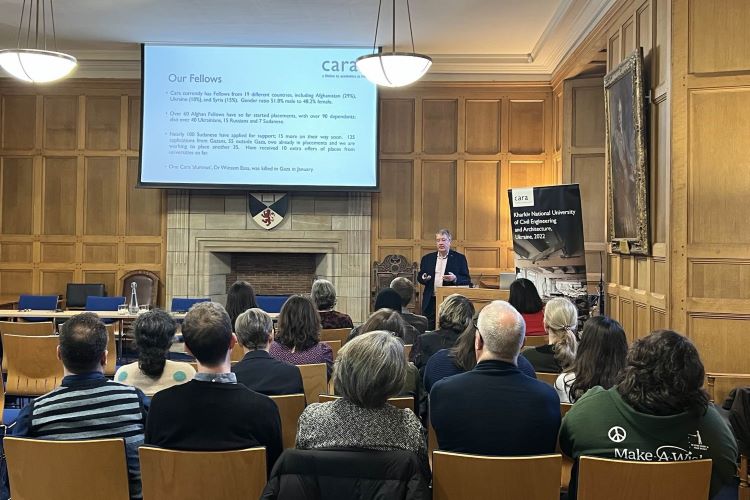Safe spaces for Sanctuary scholars

Supporting those seeking sanctuary is not just about providing a safe space—it’s about creating an environment where individuals can thrive, feel connected, and access the resources they need.
Thanks to the funding from Scotland’s Future Series, we undertook several key initiatives to enhance the support we provide to our Sanctuary scholars. Here’s a look at what we achieved:
The main initiative was hiring an intern whose primary task was to create and analyse a short survey, which offered an initial snapshot of the scholars’ experiences and needs. Building on this, the intern conducted semi-structured interviews with several Sanctuary scholars. These interviews were crucial in uncovering detailed insights into the challenges our scholars face, the support systems they rely on, and areas where additional assistance might be needed.
The findings from the survey and the interviews have been instrumental in guiding our approach to supporting Sanctuary scholars. Therefore, we have planned an online session for our Sanctuary scholars to learn more about the support provided to all students and them, in particular. This session will host colleagues from different departments: the Global Office, Money Advice, Student Services, Scholarships and the Students’ Association. Also, findings were presented in an event for Refugee Week ‘Stories of Forced Displacement’. A 10-minute presentation was prepared for an audience from the St Andrews community (students and staff) to showcase our work around forced migration and the challenges refugees and asylum seekers, with a focus on our Sanctuary students, face in their education and social life in St Andrews.
Another major highlight of our project was the Sanctuary Celebration Event held in March. The event kicked off with opening remarks from our Principal and Vice-Chancellor, Professor Dame Sally Mapstone. The main feature of the event was the Sanctuary Lecture, delivered by Dina Nayeri, a celebrated author whose own experiences as a refugee have deeply informed her work. The lecture took the form of a conversation between Dina and Dr. Roxani Krystalli, where they discussed how a sense of place influences personal journeys—geographically, professionally, and emotionally.
This conversation was particularly illuminating as it delved into how the experience of seeking refuge has shaped Dina’s understanding of sanctuary. It also explored the complex politics of storytelling surrounding violence, migration, and dignity, offering attendees profound insights into these critical issues.
Recognising the need for clear, accessible information, we designed and printed two key brochures as part of our project. The first brochure was created for our Sanctuary scholars. This guide is packed with practical information to help scholars navigate the various services and support systems available to them within our institution. The second brochure was developed for the wider community in St Andrews and beyond providing them with an overview of the work we do around sanctuary and forced migration.
We are also organising a reception for the incoming cohorts. This event will be an opportunity for scholars to meet one another, build connections, and learn about the various support systems available to them. By fostering a sense of community, we aim to help these scholars feel more at home and empowered to take full advantage of the opportunities available to them.

Furthermore, we are proud to be a supporter of the Council for At-Risk Academics (CARA). Our work continues via their Researchers at Risk Fellowships, which are being organised in association with the UK National Academies. Due to the Recent humanitarian crises which have led to a surge in applications seeking support from Cara, we have organised a networking event to learn more about CARA’s work and the work between Cara and St Andrews and explore potential partnerships. We used some of the money to cover some of the expenses of the event.
These initiatives represent a significant effort to enhance the support we provide to sanctuary scholars. From in-depth and insightful discussions to practical resources and community-building events, we have worked hard to ensure that our institution is a place where sanctuary scholars can thrive.
by Nihaya Jaber, Sanctuary and Scholarship Support Officer, Global Office